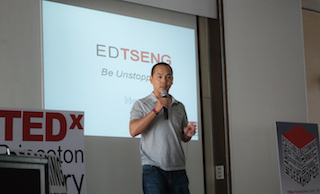The entrepreneur helping Cambodian women build one of the most lucrative hair manufacturing businesses; the Modernist writer paving her own way against censorship; and the couple working together to bring entrepreneurship to struggling communities--these stories have inspired me because they bear witness to the small ways people can make a big impact.
But what about the power of teaching people to change their own lives? And not just their economic livelihood or their safety and security, but changing the way they see themselves.
Meet Ed Tseng, a best-selling author and speaker who has dedicated his life to helping people through mental performance. I met Ed in my new hometown of Princeton where he was talking about his new book -- a must read. "Game. Set. Life. Peak Performance for Sports and Life" has been on Amazon's Top 10 in Sports Psychology and his message has been heard at TEDx as well as a number of top corporations and nonprofit organizations around the country. I recently spoke with Ed about what mental performance means and how it can help people change their own lives and find success.
Steve Mariotti: What exactly do you do, and who do you help?
Ed Tseng: I started as a tennis teaching pro but there was no room to grow -- so I started my own business. I help business professionals, athletes, students, and performers from all walks of life improve their results by teaching them how their minds work. As a by-product, they improve in areas such as: focus, motivation, stress reduction, and more.
SM: How did you get started with this approach?
ET: While teaching traditional mental training and sport psychology techniques, I ran across a book entitled "Stillpower" which talked about a new paradigm in the mental side of peak performance for athletes, business leaders and students.
SM: How is your coaching approach different?
ET: My approach is very different from what else is out there in that instead of giving strategies, techniques, or advice, I simply teach people where their experience is coming from and how every feeling. For example, nervousness, anger, anxiety, happiness, confidence -- those come from within, rather than from other people, situations, or circumstances. When people realize that every feeling is coming from thought, they become empowered instead of being a prisoner of a situation/person/thing.
I recently received an email from a client and the first sentence was, "Thank you, you changed my life!" I have seen many people with depression and anxiety suddenly optimistic and loving life just from learning about how the mind works. I worked with a basketball player trying to get into the NBA and after a few sessions with me, he reported that he played in "the zone" for the last five games. He had never played in the zone for five games in an entire season much less in a row. To me, I was thrilled for him, but also not surprised because I know how powerful we all are.
People are at their best when their minds are clear -- that means less thinking. People are at their worst when their minds are cluttered -- when they are thinking a lot. What most people in the world don't know is that we self-correct. The same way that our bodies form scabs and heal injuries, our minds do the same. Our minds reset to clarity, focus, confidence, and motivation without any involvement from us.
The late, great Yogi Berra said, "You can't think and hit at the same time. A full mind is an empty bat." In fact, I once asked Yogi how he prepared for games and his response was, "I didn't... I just played."
SM: What should people "do" when they feel stressed, anxious, or angry?
ET: That is one of the most common questions I get and the answer is absolutely nothing. Do nothing. All you need to realize is that it's all just thought. If we are feeling stressed, anxious, or angry, it's only because we are having stressed, anxious, or angry thoughts, and if left alone, they will go away on their own. I once worked with a woman who had anxiety for 40 years (her entire life) and once she learned about how her mind worked, she turned into an outgoing and optimistic person. It was amazing to see.
SM: But those thoughts seem so real. Are they not?
ET: Thoughts are not real, but they certainly feel real.
When we have a bad dream, we feel it with all of our senses. We wake up with our heart racing, body sweating, and feeling frightened. But our dreams are simply what we think about when we are sleeping, so if we don't believe our thinking when we are sleeping, why do we believe our thinking when we are awake? People have nightmares, and people also have daymares... and they scare themselves which affects their behavior.
Some of the most powerful things are the simplest. We tend to overcomplicate and analyze things. If we know we are at our best when our minds are clear, then why would we analyze or use a technique that just makes us think more?
Interested in learning more? Check out Ed's website www.edtseng.com


